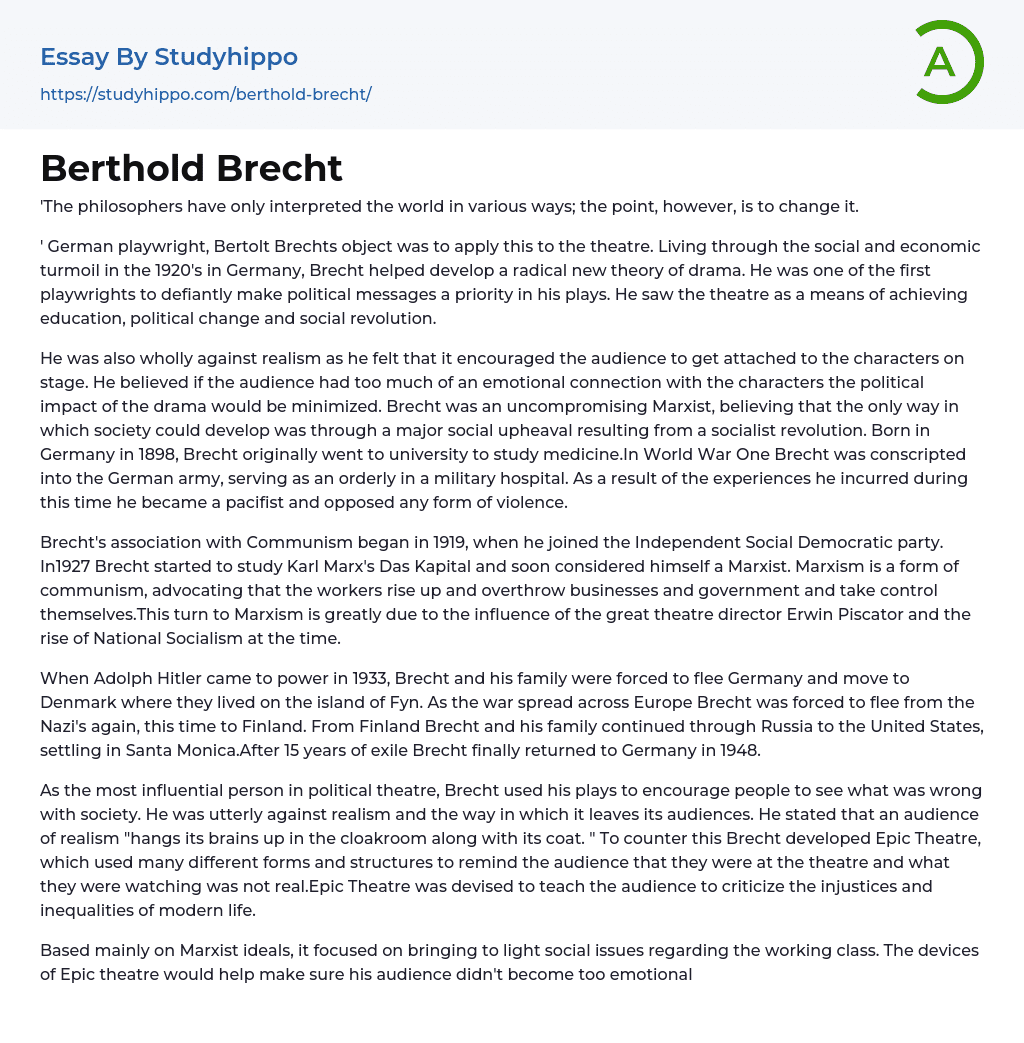'The philosophers have only interpreted the world in various ways; the point, however, is to change it.
' German playwright, Bertolt Brechts object was to apply this to the theatre. Living through the social and economic turmoil in the 1920's in Germany, Brecht helped develop a radical new theory of drama. He was one of the first playwrights to defiantly make political messages a priority in his plays. He saw the theatre as a means of achieving education, political change and social revolution.
He was also wholly against realism as he felt that it encouraged the audience to get attached to the characters on stage. He believed if the audience had too much of an emotional connection with the characters the political impact of the drama would be minimized. Brecht was an uncompromising Marxist, believing that the only way in whi
...ch society could develop was through a major social upheaval resulting from a socialist revolution. Born in Germany in 1898, Brecht originally went to university to study medicine.In World War One Brecht was conscripted into the German army, serving as an orderly in a military hospital. As a result of the experiences he incurred during this time he became a pacifist and opposed any form of violence.
Brecht's association with Communism began in 1919, when he joined the Independent Social Democratic party. In1927 Brecht started to study Karl Marx's Das Kapital and soon considered himself a Marxist. Marxism is a form of communism, advocating that the workers rise up and overthrow businesses and government and take control themselves.This turn to Marxism is greatly due to the influence of the great theatre director Erwin Piscator and the
rise of National Socialism at the time.
When Adolph Hitler came to power in 1933, Brecht and his family were forced to flee Germany and move to Denmark where they lived on the island of Fyn. As the war spread across Europe Brecht was forced to flee from the Nazi's again, this time to Finland. From Finland Brecht and his family continued through Russia to the United States, settling in Santa Monica.After 15 years of exile Brecht finally returned to Germany in 1948.
As the most influential person in political theatre, Brecht used his plays to encourage people to see what was wrong with society. He was utterly against realism and the way in which it leaves its audiences. He stated that an audience of realism "hangs its brains up in the cloakroom along with its coat. " To counter this Brecht developed Epic Theatre, which used many different forms and structures to remind the audience that they were at the theatre and what they were watching was not real.Epic Theatre was devised to teach the audience to criticize the injustices and inequalities of modern life.
Based mainly on Marxist ideals, it focused on bringing to light social issues regarding the working class. The devices of Epic theatre would help make sure his audience didn't become too emotionally involved. He didn't want his audiences to believe what was happening on stage and get drawn in, as this would cause them to stop thinking and stop questioning the message the performance was trying to deliver.He wanted his audience to keep an emotional distance from what was happening on the stage in order break the 'illusion' of
theatre. Certain alienation techniques (The 'Verfremdungseffekt') were used in order to break the emotional link between the actors and the audience. Alienation simply means to make the audience aware that they are in a theatre watching a play.
It challenges the audience to think about the message which is being delivered on stage. There were many different devices Brecht used in order to create this.Songs and chants, actors stepping out of character to comment upon the action, the scene moving into either the future or past, actors playing multiple characters and strange movement were all common techniques used in order to create alienation. The use of simple costumes and simple props helped to stop the audience getting attached to the characters and their surroundings.
The changing of scenes would take place in front of the audience without the use of a curtain, allowing the illusion of theatre to be broken. The actors were never to become the characters they were to portray, they were instead to try and represent that character.
- Frederick Douglass essays
- Mahatma Gandhi essays
- Joseph Stalin essays
- Geert Hofstede essays
- George Eliot essays
- Ginevra King essays
- John Keats essays
- Siegfried Sassoon essays
- Ben jonson essays
- Billy elliot essays
- Wilkie collins essays
- John Proctor essays
- Harriet Tubman essays
- Napoleon essays
- Robert E Lee essays
- Rosa Parks essays
- Dred Scott essays
- Business Law essays
- Contract essays
- Consumer Protection essays
- Property essays
- Ownership essays
- Agreement essays
- Common Law essays
- Contract Law essays
- Justice essays
- Security essays
- Tort Law essays
- United States Constitution essays
- Crime essays
- Lawsuit essays
- Treaty essays
- Family Law essays
- Marijuana Legalization essays
- Constitution essays
- War on Drugs essays
- Court essays
- Jury essays
- Police essays
- Protection essays
- Community Policing essays
- Criminal Law essays
- Judge essays
- Lawyer essays
- Employment Law essays
- Copyright Infringement essays
- Injustice essays
- Intellectual Property essays
- Breach Of Contract essays
- Jurisprudence essays




